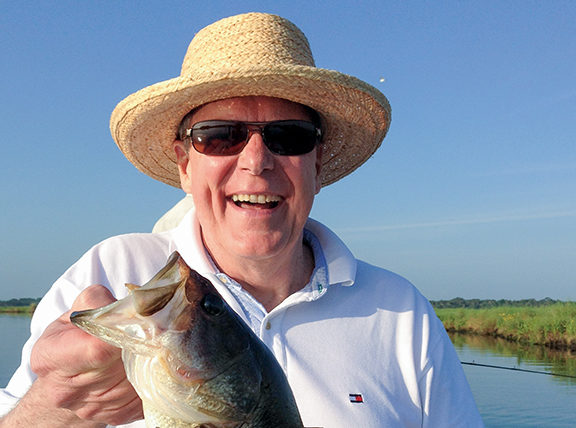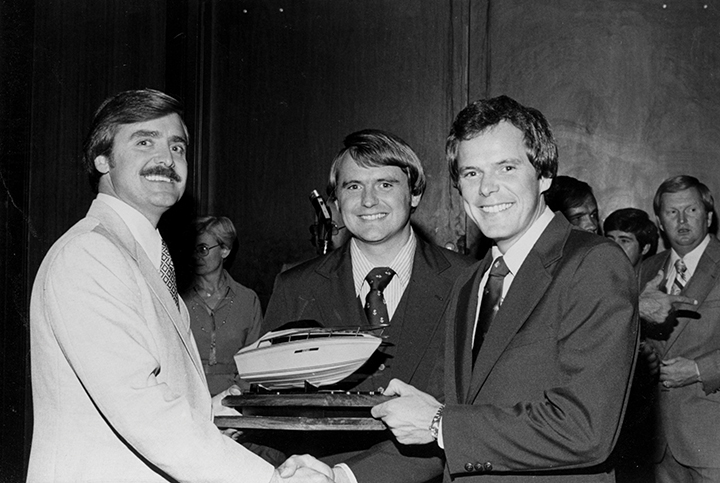Profiles in Leadership: David Parker

By Wanda Kenton Smith
David Parker’s love for boating began in childhood while enjoying family recreational outings. He fondly recalls cruising up the St. Johns River from Sanford, Fla. aboard his dad’s trusty twin engine, wooden Chris-Craft cruiser, and dropping anchor for weekend camping adventures. He also remembers fun family excursions along the Kissimmee Boat-A-Cade, and annual boat treks via the Silver Dollar Cruise along the Kissimmee River.
His marine industry career began at 15 when he gained employment with his family’s Parker Boat Company business, a Sea Ray dealership based in Orlando. Over a 17-year span, David rotated through the ranks from lot boy to rigger, mechanic, parts/service manager, posts in sales and sales management, F&I and eventually accounting. This hands-on experience in virtually all aspects of retail operations provided unique insight that has served him well throughout his stellar 50-year career.
Eventually, David sold out to his brother Roy Jr. and left the comfort of the family retail nest to work in real estate development. Five years later, he was recruited by Duane Spader to join the Spader Companies who had facilitated the industry’s first 20 Group in October 1978, of which Parker Boat Company was an original member. David invested four years facilitating four separate 20 Groups for Spader, taught several training courses and exclusively handled 1:1 individual dealership consultation.
When the economy took a dive in 1993 and he found himself a victim of a layoff, David took a big breath and a giant leap of faith. With a wealth of experience gained over 22 years in the marine industry retail trenches, he chose to launch his own consulting company – Parker Business Planning.
For the past 28 years, David has built a highly respectable business, working with several hundred retail dealers and facilitating as many as nine 20 Groups at once, all exclusively within the marine space. Today, he facilitates seven 20 Groups – five dealership and two Freedom Boat Club groups. In 2020, 39 of the Boating Industry Top 100 Dealers were current or former Parker 20 Group members.
BI: As you reflect on your career spanning 50 years, what have you enjoyed most?
DP: I have enjoyed the many friendships and relationships built over the years. It’s been gratifying to work with dealers and help to change their lives. I’ve witnessed them become more professional and profitable and observed the quality of their lives elevate significantly, allowing more freedom to be away from the business and spend more time with their families.
BI: What’s some of the best advice you’ve ever received about the boating business, and who gave it?
DP: When my brother Roy Parker and I first took over the business from our parents, our banker Bob Cumbie asked, “When are you going to start working smarter instead of harder?” That led us to join the first marine 20 Group and it changed our lives.
Probably the second-best piece of advice I was given came from Dick Kyleberg, a fellow Sea Ray dealer from Denver who was a Harvard MBA … something you didn’t see very often in our industry. He challenged us to “Run your boat business like a business, not like a hobby.” Wise words I continue to share today.
BI: While you could no doubt write a book on successful strategies for marine retail dealerships, what would be your Top 5 Tips for improvement?
DP: 1. Join a 20 Group: it will improve your professionalism and profitability.
2. Increase your margins on boat sales.
3. Raise labor rates.
4. Go after F&I (Finance & Insurance Income).
5. Align yourself with growth-minded manufacturers.
BI: You’ve worked with hundreds of retailers over 50 years. What’s the biggest mistake most boat retailers make?
DP: Thinking they are a “know it all” and don’t need to learn or grow. Complacency.
BI: Based on your experience, what do you believe is the biggest short- and long-term challenge facing boat dealers today?
DP: The major short-term challenge is insufficient inventory. Dealers must learn to sell upcoming production slots. They need to work out agreements with existing customers to show and demonstrate their boats to prospective customers.
The long-term challenge: more and more mom-and-pop stores are going away.
BI: Let’s talk about retail compression and the rapid growth of the mega dealership which you’ve cited. Do you see this trend continuing to evolve? How can smaller independent dealers compete?
DP: I believe consolidation will continue. It is easier for a manufacturer to work with one dealer who controls a market with multiple stores than with a number of smaller ones.
However, independents can compete by becoming more professional and profitable. Joining a 20 Group is one of the fastest ways to do that. In addition, independents should consider expanding with additional locations in their market area.
BI: Based on your observations of the dealers you work with, what are some of the best practices that have emerged during the pandemic?
DP: Dealers have been blessed with higher margins, low marketing costs and extremely low inventory carrying costs as most boats are sold prior to arrival. I’m hopeful that the habit of higher margins will remain when the inventory starts to rebuild. Salespeople are making more money than ever. Hopefully, they will get accustomed to that and maintain margins.
BI: In a period where more sales transactions are happening remotely/digitally and offsite, what value do you place on dealership showrooms and facilities … and why?
DP: I believe dealership showrooms will always be important. The more expensive the boat, the more crucial they become. Eventually customers want to see, feel and touch what they are about to purchase.
The internet does play a significant role in that it has shortened the sales and buying process. However, once a customer enters your showroom, that customer is yours to lose if the experience does not match
their expectations.
BI: With employment, recruitment and retention a major issue facing retailers, what is your recommendation on how dealers can attract and retain top talent in all areas of their operations?
DP: Typically, people will only leave their employment if two things are in place: desire and opportunity. You cannot control the opportunity, but you can have influence over the desire.
Create an environment where people want to come to work. Try to match talent with the tasks: match personalities with the right kind of jobs. I recommend using Omnia Profiles for this.
Another important suggestion: work hard, yet have fun doing it. If people love their jobs, they will not consider it work. Have social functions where employees can get to know each other. I’m aware of one business that has employees exchange jobs for a short time… it gives everyone a renewed respect for one another’s positions.
Train, train, train your employees! Henry Ford once said long ago, “The only thing worse than training your employees and having them leave is not training them and having them stay.”
Another highly successful dealer summed up his keys to employment success like this:
1. Hire the best people available to do the job
2. Agree on the goals and the compensation
3. Give them the tools they need to do the job
4. Get out of the way
BI: What do you believe will be the biggest change impacting boat dealerships over the next decade?
DP: I can’t predict the future, and I don’t know what will happen, but I do believe the trend toward consolidation will continue to be a major challenge for smaller retailers. We will also likely need to learn how to sell and work on electric-powered craft, which will most likely require much less service and maintenance. Another growing issue is access to waterways, as some areas are really crowded.
I do know that business is dynamic, always changing … therefore we all need to be open-minded, alert and flexible. It’s why I so strongly advocate being in a 20 Group as it will help dealers stay abreast of trends and changes and will help them develop strategies to meet them.
BI: A few personal questions. First, do you have any professional mentors who have helped shape and/or positively influenced your career?
DP: Duane Spader who started the first marine 20 Group and Mike Joyce of Hargrave Yachts who has shared his considerable wisdom with me over many years.
BI: Favorite authors? What’s the last best book you’ve read …and why is it so highly valued?
DP: The Bible: the wisdom and truth in it is amazing.
BI: What are some of your favorite sayings or life mantras?
DP: “If you love your job, you will never work again.” I love helping dealers.
“A smooth sea never made a skilled sailor.”
And, “The Lord is the source of my income, not me.” Finally, in the context of people thinking they are the only one who can do their job, I always respond: “Cemeteries are full of irreplaceable people.”





